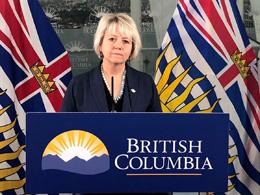B.C. Shares Spring COVID, Flu and Measles Update

Bonnie Henry
By Michelle Gamage
Local Journalism Initiative Reporter
Around 40 people were in hospitals across B.C. with COVID as of the beginning of this month, Provincial Health Officer Dr. Bonnie Henry said.
For COVID, “really that’s the lowest it’s been in many years, since the summer of 2020,” she said. But COVID tends to surge in the spring and summer, she added.
Starting April 8, British Columbians can access a spring COVID-19 vaccine— the same one used in the fall and winter—which could boost immunity for anyone who hasn’t had a vaccine or infection in the past three months, said Andy Watson, communications director for the Public Health Officer.
The province is offering an mRNA vaccine that protects against the KP.2 subvariant. During the fall and winter campaign, 1.1 million people in B.C. were vaccinated against COVID and 1.3 million against the flu, out of a population of 5.7 million.
B.C. has been experiencing its worst flu season since before the pandemic, Henry said. RSV peaked in February and has since declined.
The National Advisory Committee on Immunization recommends the spring COVID shot for people at highest risk of serious illness—adults 65+, Indigenous adults 55+, those in long-term care, and clinically extremely vulnerable individuals aged six months and up. B.C. will prioritize these groups, but others are also welcome to book a shot, the Health Ministry told The Tyee.
Notifications to book appointments start April 8, and shots will be available until June 30 at 400 pharmacies and health-care centres. Public health units will also provide vaccines for children under 12.
Henry declared the cold and flu season over Friday, ending the requirement to wear masks in all health-care settings, though she still encourages people to wear them.
Henry also said there are five confirmed cases of measles in the province, all likely contracted while travelling in Southeast Asia.
“Increasingly, we’re seeing cases of measles in parts of Canada, with outbreaks in Ontario and cases here in B.C., and around the world,” she said. “Measles can cause serious illness, particularly for young people who are not vaccinated. And we have tragically had one death in Canada last year.”
An unvaccinated child under five died in Hamilton in May 2024, according to the CBC.
Henry urged people to check if they’ve had both measles vaccine doses. The vaccine is free in B.C.
The Tyee previously reported that B.C.’s current measles vaccination rate is lower than in Gaines County, Texas, where a recent outbreak killed an adult and a six-year-old child.
Parents of children aged seven to nine should double-check their vaccination records, in case their immunizations were disrupted during the pandemic, Henry said.
People born before 1970 are assumed to have immunity. Those who received only one dose before 1996 should get a second to ensure full protection.
“If you’re not sure or don’t have your records, getting an additional dose does not have any harms and it makes sure you are protected for the rest of your life,” Henry said.
One dose offers 85–95 per cent protection; two doses offer 97–100 per cent, Dr. Jia Hu, interim medical director at the BCCDC, previously told The Tyee.
Children should receive their first dose at age one and their second around kindergarten. Those travelling to outbreak areas can receive their first dose at six months and a second between ages one and four, the Health Ministry said.
This includes travel to Ontario, where 572 cases have been reported since October 2024, and Quebec, which has reported 40 cases since December. Ontario has seen 40 hospitalizations, mostly children. Outbreaks have also occurred in New Brunswick, Saskatchewan, and internationally.
“These have been linked to other large outbreaks in North America, particularly in Texas, in the U.S. and in Mexico,” Henry said.
Babies younger than six months can’t receive the vaccine as their immune systems aren’t ready, Henry said. Unvaccinated individuals can contract measles from minimal exposure and be contagious before showing symptoms.
“That’s what’s so worrisome about this virus and why it’s so important that we take those measures now to protect ourselves from getting infected in the first place,” she said.









